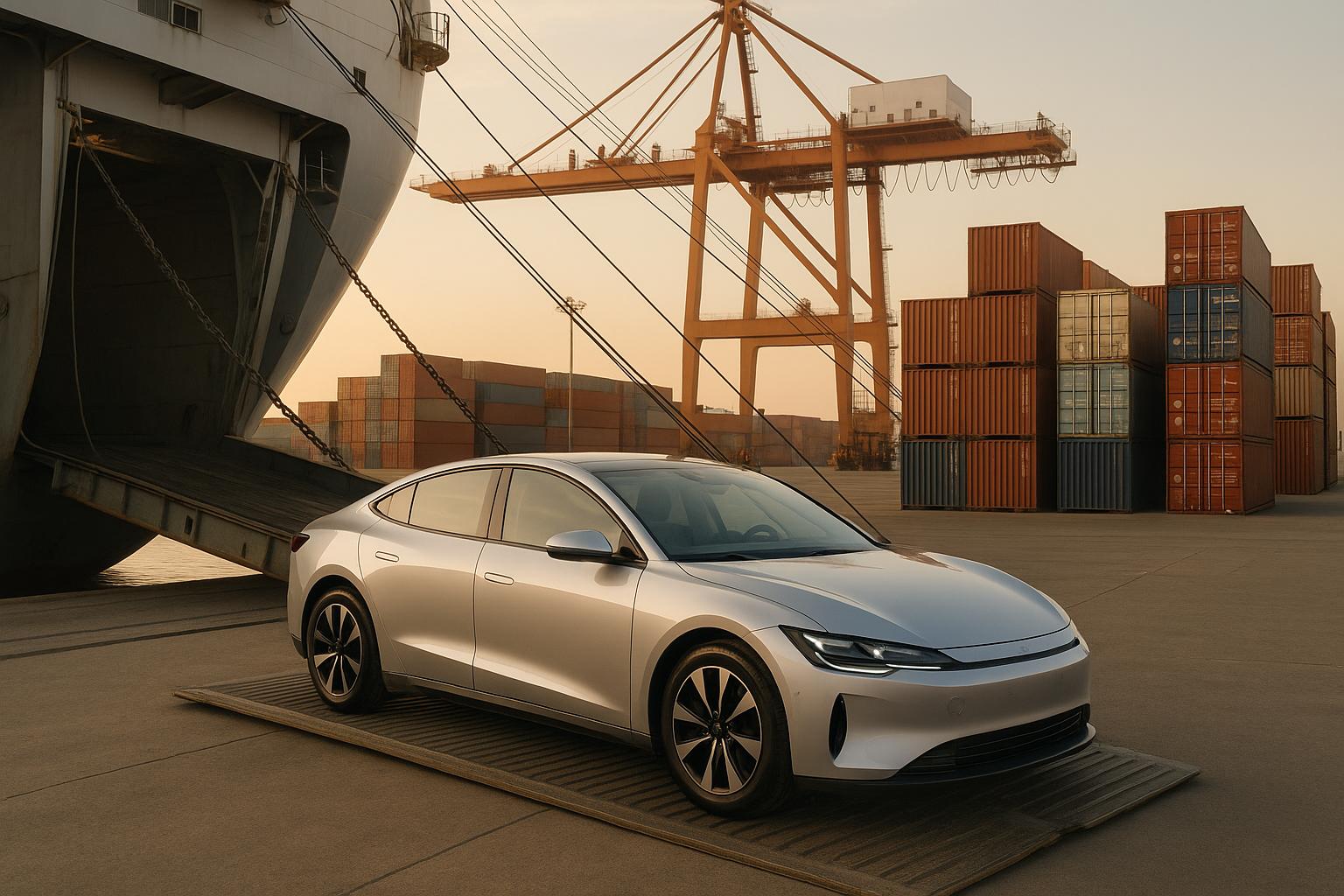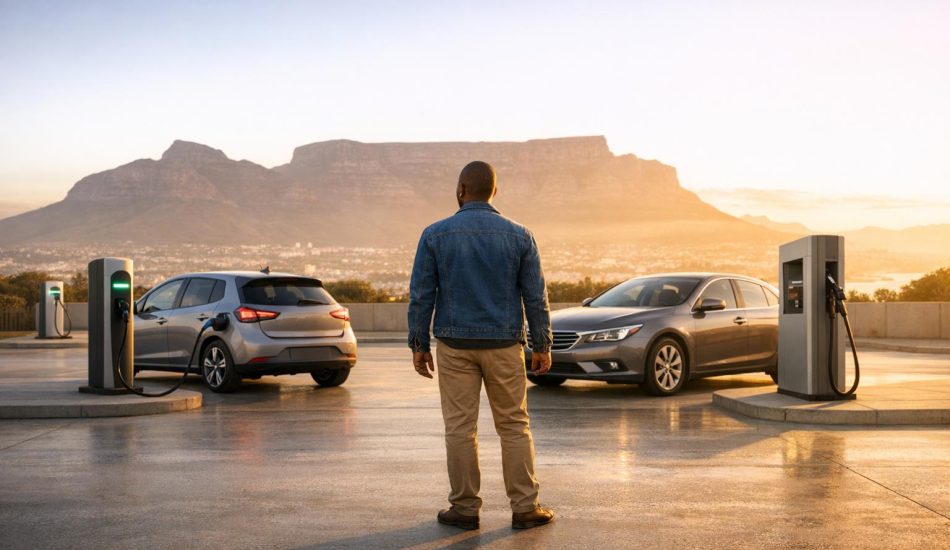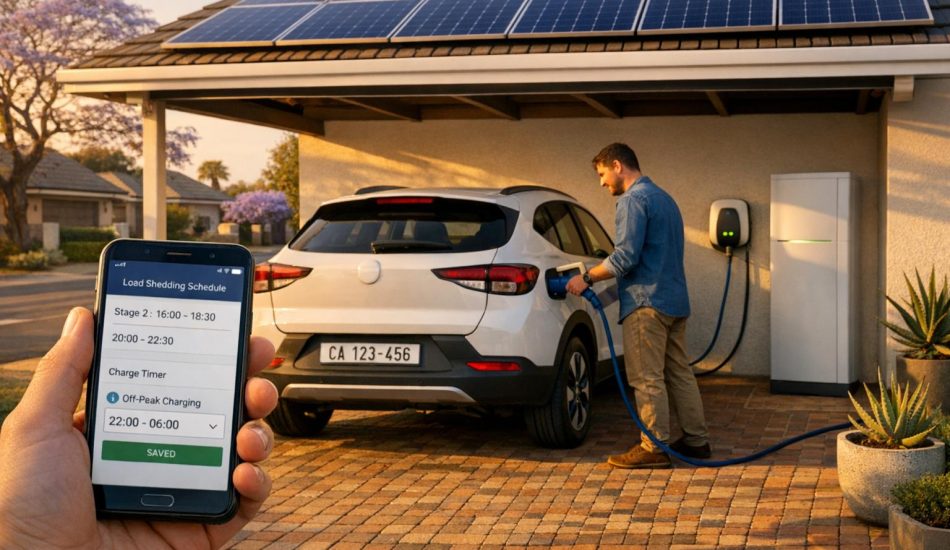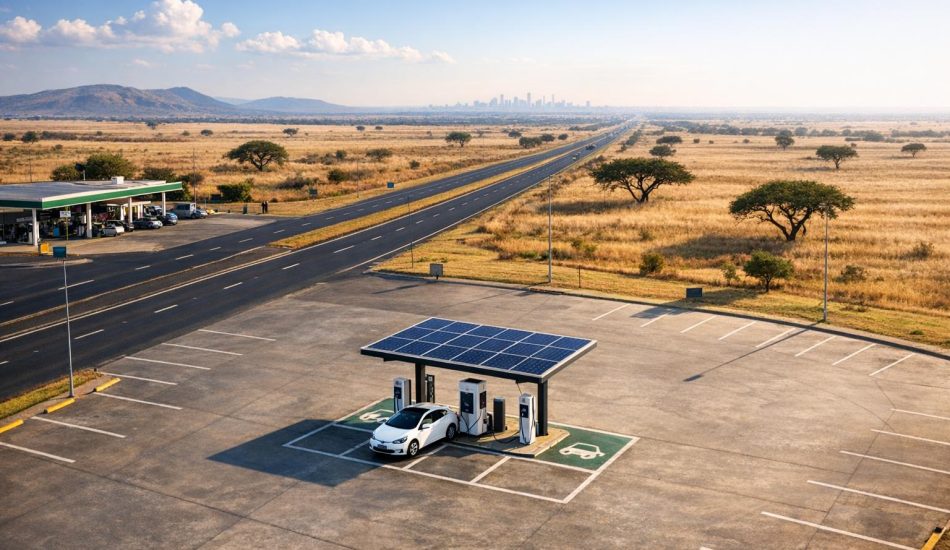
Importing electric vehicles (EVs) from China to South Africa in 2025 offers a cost-effective way to access high-quality models like BYD, Ora, and MG. With rising fuel prices and EVs making up just 1% of vehicles on South African roads, this is a prime time to enter the market. However, the process involves navigating import permits, safety standards, and taxes, which can be complex without proper guidance.
Key points to know:
- Why Import from China? Competitive pricing, advanced technology, and right-hand drive models suited for South Africa.
- Costs to Consider: Include vehicle price, shipping ($1,500–$2,500 per car), 25% import duty, and 15% VAT.
- Steps to Import: Find reliable suppliers, arrange shipping, handle customs clearance, and register the vehicle locally.
- Regulations: Ensure compliance with South African safety standards and secure necessary documentation.
For a smoother process, services like EV24.africa can help manage supplier verification, customs, and aftersales support, making it easier to tap into South Africa’s growing EV market.
How to Import Electric Cars from China?
Legal and Regulatory Requirements
Bringing electric vehicles into South Africa comes with a set of strict regulations that must be followed. Knowing these rules ahead of time can save you from delays and unexpected expenses. Below, we break down the permits, standards, and taxes you’ll need to navigate for a smoother import process.
Import Permits and Required Documents
Before your electric vehicle can enter South Africa, you’ll need to secure the proper import documentation. This includes proof of purchase, detailed vehicle specifications (like the VIN and motor or battery details), and any relevant manufacturing certificates. The process can be complex, so it’s a good idea to work with a customs clearance agent who has experience in handling EV imports.
South African Safety and Quality Standards
Electric vehicles imported into South Africa must meet strict safety and quality standards set by the National Regulator for Compulsory Specifications (NRCS). Specifically, the "Compulsory specifications for electrical and electronic apparatus (VC 8055)" defines the standards for key electrical components. Additionally, these vehicles must align with international safety protocols outlined in Global Technical Regulation No. 20 (GTR No. 20) on Electric Vehicle Safety.
Import Taxes and Duties
Importing an electric vehicle involves several taxes that significantly affect the overall cost. For light vehicles, import duties are typically 25% of the vehicle’s declared value. However, vehicles coming from the EU may qualify for a reduced duty rate of 18% under preferential trade agreements. On top of that, a 15% Value-Added Tax (VAT) is applied to the total cost, which includes the vehicle price, shipping, insurance, and import duties.
All imported goods are subject to three main types of charges: customs duties (including additional ad valorem duties), anti-dumping and countervailing duties, and VAT. Since every import incurs these fees (due to a de minimis value of $0), it’s crucial to pay them before customs clearance. First-time importers are strongly encouraged to consult with experts to ensure compliance and avoid costly mistakes.
Step-by-Step Import Process
Bringing an electric vehicle from China into South Africa requires a series of well-organized steps, from finding the right supplier to completing the registration process.
Finding Reliable Suppliers
Start by researching suppliers with proven export experience. Check their track records, ask for references, and ensure they can provide detailed vehicle specifications. It’s also essential to clarify their after-sales support policies. Open and consistent communication is key to confirming that their vehicles meet local standards and requirements.
Once you’ve identified a trustworthy supplier, you can move on to planning the shipping process.
Shipping and Transport Options
Partner with an experienced logistics provider to select the best shipping method for your needs. Factors like transit time, cost, and insurance coverage should guide your decision. A skilled freight forwarder can handle the coordination of shipping logistics and oversee port procedures, ensuring a smooth process.
After shipping is arranged, the focus shifts to customs clearance and registration.
Customs Clearance and Vehicle Registration
When the vehicle arrives in South Africa, customs clearance is the first priority. Prepare essential documents, such as the bill of lading, commercial invoice, and required certificates, to streamline the process. Collaborating with a knowledgeable customs agent can help you navigate regulations and avoid unnecessary delays.
Following customs clearance, the vehicle may need to pass inspections to confirm compliance with South African safety and quality standards. Once it meets these requirements, you can proceed with the local registration process. Be sure to verify specific registration guidelines with your regional authorities to ensure everything is in order.
sbb-itb-99e19e3
Import Costs and Budget Planning
Understanding all associated costs is key to avoiding unexpected expenses and effectively planning your import budget. Let’s break down the costs and explore some practical tips to keep your budget on track.
Complete Cost Breakdown
When importing a vehicle, here’s what you’ll need to account for:
- Vehicle purchase price: The amount you pay your Chinese supplier for the vehicle itself.
- Shipping fees: These can vary depending on the shipping method you choose and the destination port. Always request detailed shipping quotes to avoid surprises.
- Import duties and taxes: These are calculated based on the landed cost of the vehicle.
- Additional fees: This includes expenses for customs clearance, inspections, vehicle registration, and local transportation.
Factoring in these costs early will help you stay prepared and avoid financial hiccups.
Payment Methods and Budget Tips
When it comes to payments and budgeting, consider these strategies:
- International wire transfers: These are a secure and traceable way to make payments to your supplier.
- Escrow services: For added peace of mind, escrow services can hold your payment until you’ve confirmed the vehicle meets your expectations.
- Contingency budget: Set aside extra funds to cover unexpected costs or exchange rate fluctuations.
- Payment timeline: Plan your payment schedule carefully to maintain good cash flow throughout the process.
Supplier Selection and Vehicle Sourcing
Choosing the right supplier is a critical step when importing electric vehicles (EVs). With the Chinese EV market offering a wide range of options, it’s essential to partner with reputable brands and verified suppliers who understand export procedures and can deliver vehicles that meet South African standards.
Best Chinese EV Brands for South Africa
Some Chinese EV manufacturers have established strong reputations globally, offering models well-suited to South African conditions. BYD, for instance, provides a diverse lineup of electric vehicles, ranging from compact cars to SUVs, and has been expanding its presence internationally.
Geely is another excellent choice, particularly because of its focus on right-hand drive markets. Its E5 battery-electric SUV, set to launch in 2025, is designed specifically for such markets and aligns with South African road standards.
Leapmotor has gained attention for its vehicles equipped with advanced technology features. Other noteworthy brands include Great Wall Motor, Chery, and SAIC Motor. When selecting a brand, pay attention to factors like after-sales service, the availability of spare parts, and the feasibility of establishing a dependable local service network in South Africa. Once you’ve identified potential brands, ensure their suppliers meet all necessary South African requirements.
How to Verify Supplier Credentials
Verifying a supplier’s credentials is essential to avoid costly missteps. Start by examining their registration details, export licenses, and quality certifications. Suppliers with prior experience exporting to South Africa or similar markets are often better equipped to handle specific requirements, such as right-hand drive configurations, which are mandatory for South African compliance.
Ask for customer references and, whenever possible, reach out to previous buyers. A factory visit – or even a virtual tour – can provide valuable insights into their production capabilities and quality control measures. Reliable suppliers are usually open to sharing references or showcasing their track record on reputable trade platforms.
Communication is another key indicator. Prompt and clear responses often signal a trustworthy partner and can help identify potential issues early in the process.
Financial due diligence is equally important. Review the supplier’s financial stability and payment terms. Be wary of suppliers demanding full payment upfront or offering prices that seem far below market averages – these could be red flags.
Lastly, confirm that the supplier can provide all required export documentation, such as certificates of origin, quality certifications, and shipping documents. They should also be familiar with South African import regulations to ensure smooth compliance and hassle-free transactions.
Conclusion: Simplify Your Import Process with EV24.africa

Importing electric vehicles (EVs) can be a complex task, requiring careful navigation through regulations, logistics, and documentation. From verifying suppliers to managing customs procedures, the process can easily overwhelm both new importers and experienced businesses.
EV24.africa takes the hassle out of EV importing by providing comprehensive, end-to-end support. They address key challenges like import duties, SABS compliance, and right-hand drive requirements, ensuring every step is handled with precision.
"At EV24.africa, we simplify the process of importing and buying electric vehicles in Africa. Our expertise ensures a seamless, transparent, and stress-free experience, so you can focus on driving the future of mobility."
From sourcing trusted brands such as BYD, XPeng, and Leapmotor to coordinating shipping from Durban, EV24.africa handles every detail. They also manage ITAC permit applications and customs clearance, ensuring a smooth process from start to finish.
Through partnerships with reliable suppliers and logistics providers, EV24.africa secures competitive shipping rates, typically ranging from $1,500 to $2,500 per vehicle. This approach helps customers avoid hidden costs and surprises. Additionally, their supplier verification process guarantees that all vehicles meet export qualifications and quality standards, making it easier to source compliant right-hand drive models.
But their support doesn’t stop at delivery. EV24.africa offers ongoing aftersales services, including assistance with EV parts, home chargers, and performance upgrades. This ensures buyers have the resources they need to maintain and enhance their vehicles.
By combining detailed support with competitive pricing, EV24.africa transforms a potentially time-consuming import process into a streamlined experience. For South African buyers looking to enter the growing EV market in 2025, partnering with EV24.africa reduces risks and simplifies the journey. With a proven track record of transparent pricing and reliable service, they make EV importing accessible for both individuals and businesses eager to embrace sustainable transportation.
Whether you’re bringing in a single EV or acquiring an entire fleet, EV24.africa’s expertise ensures your import process is efficient, well-supported, and completed within weeks – not months.
FAQs
What challenges might arise when importing electric vehicles from China to South Africa, and how can they be addressed?
Importing electric vehicles (EVs) from China to South Africa comes with its fair share of challenges. These include steep import tariffs, complicated regulations, a lack of widespread charging infrastructure, and financing hurdles. These factors can make the process tricky for both individuals and businesses looking to bring EVs into the country.
Here are some strategies to help navigate these obstacles:
- Engage with local authorities: Understanding the tax and duty structures is crucial. In some cases, you might be able to negotiate or advocate for reduced import tariffs to make the process more feasible.
- Expand charging options: Consider investing in or partnering with companies that provide solar-powered charging stations or battery-swapping solutions. These can address the infrastructure gap while promoting sustainability.
- Streamline compliance: Ensure all customs and regulatory requirements are thoroughly met. Professional guidance from experts in international trade can simplify this step.
- Offer flexible financing: Options like leasing programs or installment plans can make EV ownership more achievable for a broader audience.
By planning ahead and working closely with reliable suppliers and service providers, you can overcome these challenges and make the import process smoother and more efficient.
What steps are involved in making sure imported electric vehicles meet South African safety and quality standards?
To make sure your imported electric vehicle is up to par with South African safety and quality standards, there are a few essential steps you need to take.
First, confirm that the vehicle adheres to all necessary specifications. This includes compliance with emissions regulations, roadworthiness criteria, and the electric vehicle (EV) standards outlined by South African authorities.
Next, gather all required documentation. This might include homologation certificates, proof that the vehicle meets safety regulations, and any testing results mandated by local agencies. Partnering with a licensed clearing agent or consultant who knows the ins and outs of South African import laws can simplify the process and help you avoid unnecessary delays.
Lastly, ensure that all customs and regulatory inspections are completed when the vehicle arrives in the country. These inspections are crucial for getting the green light to legally drive your EV on South African roads.
How can I effectively manage and budget for the costs of importing an electric car from China to South Africa?
To effectively manage and plan for the costs of importing an electric car from China to South Africa, it’s crucial to break down all the associated expenses. These typically include the purchase price, shipping fees (which usually range from $1,200 to $2,500 for container shipping), marine insurance (calculated at about 0.5%–1.5% of the car’s value), and customs duties (approximately 35% in South Africa).
When choosing a shipping method, consider your priorities. Container shipping offers better protection for your vehicle, while RoRo (Roll-on/Roll-off) is often a more budget-friendly option. To save further, you might explore bulk importing or plan your shipment during cost-effective periods. Lastly, make sure the vehicle meets South African EV standards to avoid delays or penalties that could disrupt your plans.




